
Читайте также:
|
group – группа
research group – группа для исследования
jet propulsion research group – группа для исследования реактивного движения
7. a)Read the text and substitute the underlined words and phrases with their synonyms from the box below.
 |

Valentina Tereshkova is the first woman to fly in space in 1963.
She didn’t (1) finish a university, because she had to help her mother support the family. She was a textile worker when she was selected (2) to take part in the Soviet Union cosmonaut program in 1962. She was the first cosmonaut who was not a pilot. She was (3) chosen mainly (4) because of her experience with parachute jumping. She had made more than a hundred jumps.
After 18 months of training, Tereshkova's Vostok 6 spacecraft was launched. On June 16, 1963 she went into orbit and in about 80 hours (more than three days) completed 48 orbits before returning to Earth. She parachuted from her (5) spacecraft as it fell to Earth. That is how the Vostok spacecraft (6) worked.
Her colleagues said that she (7) earned respect because of her enthusiasm and ambition, besides, she had great (8) organizational skills.
Tereshkova never flew in space again. She served in the Soviet parliament for a while.
(edited from http://www.astronautix.com)
b)Translate the text into Russian.
| You should remember the following words and phrases! | |
| to participate | принимать участие |
| managerial abilities | организаторские способности |
| decision-making | принятие решений |
| to deserve the credits | заслужить уважение |
| a weapon | оружие |
| space exploration | освоение космоса |
| to appoint | назначать |
| jet propulsion | реактивное движение |
| Deputy Chief | заместитель директора |
| cruise missile | крылатая ракета |
| manned vehicle | пилотируемое транспортное средство |
| to launch | запускать |
| space booster | ракета-носитель |
| artificial Earth satellites | искусственный спутник Земли |
| an interplanetary probe | межпланетная зондирующая ракета |
| authorities | власти |
| guidance | руководство |
| to operate | работать, управлять |
| to make contribution | сделать вклад |
| publically recognized | признанный |

Active voice – The subject performs the action
· The group of engineerslaunchedthe spacecraft.
Passive Voice – The subject receives the action
· The spacecraftwas launchedby the group of engineers.
Passive Voice is used when it is more important to stress the thing done rather than the doer, or when the doer is unknown. If the doer of the action or the instrument is mentioned, it is preceded by BY or WITH respectively.
| Tense | Form in Active Voice | Form in Passive Voice |
| Present Simple | V1, Vs /-,? do(does) | am/is/are +V3 |
| Present Continuous | am/is/are +Ving | am/is/are +being+V3 |
| Present Perfect | have/has+V3 | have/has+been+V3 |
| Present Perfect Cont. | have/has +been+Ving | - |
| Past Simple | V2(ed) /-/? did | was/were + V3 |
| Past Continuous | was/were + Ving | was/were + being + V3 |
| Past Perfect | had + V3 | had + been + V3 |
| Past Perfect Cont. | had + been +Ving | - |
| Future Simple | shall/will + V1 | shall/will + been + V3 |
| Future Continuous | shall/will + be + Ving | - |
| Future Perfect | shall/will + have + V3 | shall/will + have + been + V3 |
| Future Perfect Cont. | shall/will + have + been + Ving | - |
1. In the text (p. 3), underline all the predicates. Define the Voice.
2. Transform the Active Voice into Passive and vice versa.
a) Authorities have appointed Mr. Simon Deputy Chief of the space exploration program.
b) SSAU is publically recognized as the leading technical university in Russia.
c) I’m sure that our new manager will make a great contribution to the success of our organization.
d) The first artificial earth satellite was launched in 1957.
e) The team of engineers is testing the weapon at the moment.
f) The surface of the Moon has been explored by the interplanetary probes.
g) A new project will be presented by this research group.
h) In 1926 Korolev transferred his documents to the engineering college in Moscow.
i) Rocket weapons are being controlled by the leaders of the European Union.
j) Every year enthusiasts organize a research club in the laboratory.
3. Read the following text and put the verbs in brackets into the correct form of Active or Passive Voice
“One small step for a man, one giant leap for mankind”
In July 20, 1969 Neil Armstrong (1)__________ (to say) "one small step for a man, one giant leap for mankind". This was the day that men from the Earth first (2)__________ (to land) on the Moon. It was the culmination of years of research and development.
Neil Armstrong was born August 5, 1930 on a farm in Wapakoneta, Ohio. Neil (3)__________ (to work) at the local airport. After starting flying lessons at the age of 15, he (4)__________ (to give) a pilots license on his 16th birthday, before he had earned a driver's license.
Armstrong (5)__________ (to send) to Naval Air Station in Florida in 1949 before he (6)__________ (to graduate) from the university. He then (7) __________ (to flow) 78 combat mission in Korea, earning three medals, including the Korean Service Medal. Armstrong, being an engineer by training, (8)__________ (to criticize) by some of the non-engineering pilots, that his flying technique was too mechanical.
Then in September of 1963 he (9)__________ (to select) as the first American civilian to fly in space. Later Armstrong (10)__________ (to appoint) Command Pilot of the Apollo 11, which (11)__________ (to touch) down on the surface of the Moon on July 20, 1969. The American flag (12)__________ (to plant) on the surface by Neil Armstrong and Buzz Aldrin.
The astronauts (13)__________ (to return) to the Earth on July 24, 1969. Armstrong and Aldrin (14)__________ (to award) the Presidential Medal of Freedom.
(edited from http://space.about.com)
4. Translate the following sentences from Russian into English.
a) Ежегодно сотни исследовательских групп создаются властями для освоения космоса.
b) Первый пилотируемый космический аппарат был запущен 12 апреля 1961 года.
c) Этот молодой конструктор будет назначен заместителем руководителя группы по исследованию реактивного движения.
d) Проект по созданию нового ракетного оружия будет завершен к концу этого года.
e) Огромный вклад в развитие ракетно-космических технологий был сделан советскими космонавтами Юрием Гагариным и Владимиром Комаровым.
f) Русские были признаны первой нацией в мире, совершающей космические полеты.
g) Благодаря энтузиазму и организаторским способностям С.П. Королева крылатые ракеты, пилотируемые космические аппараты, ракеты-носители, искусственные спутники земли и межпланетные зондирующие ракеты были сконструированы и произведены в Советском Союзе.
h) Термин «пилотируемый» значит, что транспортное средство управляется человеком.

1. a) Work in groups of 2-3 people. Make a report on the biography of a famous cosmonaut or a designer and the contribution they made into the development of space exploration. You may choose to speak about:

Ø  Konstantin Tsiolkovsky
Konstantin Tsiolkovsky
Ø Kathryn Thornton
Ø Buzz Aldrin
Ø  Vladimir Komarov
Vladimir Komarov
Ø Yury Gagarin
Ø Valentin Glushko
Ø Any other scientist you consider important
b) Choose one speaker from the group and make a two-minute presentation in the name of this person.
c) Prepare at least two questions to the other speakers.

By making notes you actively process and interpret ideas and information. This aids concentration and understanding so you learn more. Notes help identify main points and organize your ideas into a logical order.
1. Key words and phrases provide instructions about what to do; trigger your memory; lead on to other ideas / explanations. They must be easy to find within your notes. Highlight such words in the following text.
 In June l967, Robert Henry Lawrence, Jr. was named the first African-American astronaut, though he never made it into space. Several months later, on December 8, Lawrence died when his F-104 Starfighter jet, in which he was a co-pilot/passenger during a training flight, crashed at Edwards Air Force Base, California.
In June l967, Robert Henry Lawrence, Jr. was named the first African-American astronaut, though he never made it into space. Several months later, on December 8, Lawrence died when his F-104 Starfighter jet, in which he was a co-pilot/passenger during a training flight, crashed at Edwards Air Force Base, California.
Robert Henry Lawrence, Jr. was born October 2, 1935, in Chicago. He received an undergraduate degree in chemistry from Bradley University in 1956, and was commissioned a Second Lieutenant into the US Air Force upon graduation at age 20. Lawrence later earned a Ph.D. in physical chemistry in 1965 from Ohio State University.
Robert Henry Lawrence, Jr. distinguished himself as an exceptional Air Force test pilot and was among the first to be named to the USAF Manned Orbiting Laboratory (MOL) program, which was a precursor to today's successful NASA space shuttle program.
In 1997, thirty years after his tragic death, the Chicago native son's name was the 17th added to The Astronauts Memorial Foundation Space Mirror. The mirror was dedicated in 1991 to honor all US astronauts who have lost their lives on space missions or in training for missions.
(taken from http://space.about.com)
2. Always write a heading or title to your notes. Give titles to the 4 paragraphs above.
3. Write notes in a logical order to show how ideas are related. The notes may be of two types: linear and patterned. Choose the one to your liking and complete it.
LinearPatterned
 I. Brief Information
I. Brief Information
 a) First Afro-American astronaut
a) First Afro-American astronaut


 b) never made it to space
b) never made it to space
 c) died in a crash
c) died in a crash




 II. Education
II. Education
a)…


 …
…
 |
4. Develop your own 'shorthand' using abbreviations and symbols. The following abbreviations could be useful:
e.g. – for example etc – and so on
i.e. – that is à so, therefore
< - less that aka – also known as
> - greater that
5. Make notes on the text about S.P. Korolev (p.3) using the techniques above.
6. Be brief, but not so brief that your notes don't make any sense. You will need to read your notes in the future and should be able to understand what you have written. Be ready to retell the text about S.P. Korolev using the notes you have made.


1. We have asked some foreigners what ideas of Russia they have (the answers are from a real Internet forum). Say which of them you agree/ disagree/ find common / surprising/shocking. Make your comments.
‘People there are very good-looking, all of them are blond. Have a look at Putin, for example!’ (China)
‘Russians love drinking vodka! P.S. Don’t worry about stereotypes, most people think that in Brazil there is only samba. I HATE samba!’ (Brazil)
‘My teacher once said that in Russia it is not a crime if husband would kill his wife. I don’t believe it, though.’ (Great Britain)
‘Cold - yeah that would be the first thing that comes to mind.’ (Trinidad and Tobago)
‘The streets are not safe from gangs and armed men.’ (Egypt)
‘hmm Stalin?:) sorry joke…I think you are good at teams sports like volleyball or basketball… football of course too.’ (Poland)
‘Russians always eat rye bread with herring.’ (Netherlands)
‘I hate Russian fashion, because there is lots of fur! Haven’t you heard of Green Peace, guys??’ (United States)
‘Russian children dream of leaving the country as soon as they are 18.’ (Germany)
‘People from Russia are very hospitable. If they invite you, you can be sure of a big welcome!’ (Italy)

1 a) Match the following geographic features with their Russian equivalents.
 1. continent 1. continent
| a) океан |
| 2. country | b) река |
| 3. city | c) континент |
| 4. ocean | d) озеро |
| 5. sea | e) страна |
| 6. river | f) пустыня |
| 7. lake | g) город |
| 8. steppe [step] | h) гора |
| 9. plain | i) море |
| 10. forest | j) равнина |
| 11. desert [‘dezƏt] | k) лес |
| 12. mountain | l) степь |
| 13. island [‘aılƏnd] | m) канал |
| 14. peninsula [pƏ’nınsjƏlƏ] | n) остров |
| 15. canal [kƏ’næl] | o) полуостров |
| 16. tundra [‘t˄ndrƏ] | p) тундра |
| 17. taiga [‘taıgƏ] | q) тайга |
b) Name the geographical features you can see on the map below.

2. Practise reading the following words and geographic names.
| the Russian Federation | ðƏ r˄ʃn feder’eıʃn |
| Europe | ‘juƏrƏp |
| Asia | eıʒƏ |
| the Pacific | ðƏ pƏ’sıfik |
| the Arctic | ðı a:ktık |
| the Atlantic | ðı Ət’læntik |
| China | tʃaınƏ |
| Mongolia | mɒŋ’gƏulıƏ |
| Korea | kƏ’ri:Ə |
| Kazakhstan | .kæzæk’sta:n |
| Georgia | ‘ʤɔ:ʤƏ |
| Azerbaijan | .æzƏbaı’ʤa:n |
| Norway | ‘nɔ:weı |
| Finland | ‘fınlƏnd |
| the Baltic States | ðƏ bɔ:ltık steıts |
| Belorussia | .belƏu’r˄ʃƏ |
| Ukraine | ju:’kreın |
| Siberia | saı’bıƏrıƏ |
| the Urals | ðı juƏrƏlz |
| the Caucasus | ðƏ ‘kɔ:kƏsƏs |
| the Altai | ðı a:l’taı |
| the Volga | ðƏ ‘vɒlgƏ |
| the Caspian Sea | ðƏ kæspıƏn si: |
| the Ob | ðı ɒb |
| the Yenisey | ðƏ jini’seı |
| the Lena | ðƏ ‘leınƏ |
| the Amur | ðı Ə’muƏ |
| the Far East | ðƏ.fa:r’i:st |
| Lake Baikal | leık ‘baıka:l |
| Moscow | ‘mɒskƏu |
| occupy | ‘ɒkjƏpaı |
| surface | ‘sɜ:fıs |
| scenery | ‘si:nƏrı |
| climate | ‘klaımƏt |
| temperate | ‘tempƏrƏt |
| legislative | ‘leʤıslƏtıv |
| executive | ig’zekjƏtıv |
| judicial | ʤu:’dıʃl |

NB!
| the with geographical names | |
| The is used before | The is omitted before |
| · Oceans · Seas · Rivers · Canals · groups of islands/states · mountain ranges, · deserts · names with ‘of’ | · continents · Names of countries, but: the Netherlands, (the) Sudan, the Vatican City · Cities, but the Hague · Individual mountains · Islands · Lakes |
3. Read the text about Russia. Complete the table.
| Location | |
| Total area | |
| Lowland/Highland | |
| Water Resources | |
| Natural Resources | |
| Population | |
| Political System | |
| Capital | |
| Colours of the flag |
 The Russian Federation
The Russian Federation
The Russian Federation is the largest country in the world. It occupies about one-seventh of the earth's surface. It covers the eastern part of Europe and the northern part of Asia. Its total area is about 17 million square kilometers. The current population of Russia is 142 million of people.
 The country is washed by 12 seas of 3 oceans: the Pacific, the Arctic and the Atlantic. In the south Russia borders on China, Mongolia, Korea, Kazakhstan, Georgia and Azerbaijan. In the west it borders on Norway, Finland, the Baltic States, Belorussia and Ukraine. It also has a sea-border with the USA.
The country is washed by 12 seas of 3 oceans: the Pacific, the Arctic and the Atlantic. In the south Russia borders on China, Mongolia, Korea, Kazakhstan, Georgia and Azerbaijan. In the west it borders on Norway, Finland, the Baltic States, Belorussia and Ukraine. It also has a sea-border with the USA.
There is hardly a country in the world where such a variety of scenery and vegetation can be found. We have steppes in the south, plains and forests in the midland, tundra and taiga in the north, highlands and deserts in the east.
There are two Great Plains in Russia: the Great Russian Plain and the West Siberian Lowland. There are several mountain chains on the territory of the country: the Urals, the Caucasus, the Altai and others. The largest mountain chain, the Urals, separates Europe from Asia.
There are over two million rivers in Russia. Europe's biggest river, the Volga, flows into the Caspian Sea. The main Siberian rivers — the Ob, the Yenisey and the Lena — flow from the south to the north. The Amur in the Far East flows into Pacific Ocean. Russia is rich in beautiful lakes. The world's deepest lake (1600 meters) is Lake Baikal. It is much smaller than the Baltic Sea, but there is much more water in it. Russia has one-sixth of the world's forests. They are concentrated in the European north of the country, in Siberia and in the Far East.
On the vast territory of the country there are various types of climate, from arctic in the north to subtropical in the south. In the middle of the country the climate is temperate and continental.
Russia is very rich in oil, coal, iron ore, natural gas, copper, nickel and other mineral resources.
Russia is a parliamentary republic. The Head of the State is the President. The legislative powers are exercised by the Duma. The executive power belongs to the Government and the judicial – to the System of Courts.
The capital of Russia is Moscow. It is its largest political, scientific, cultural and industrial centre. It is one of the oldest Russian cities.
At present, the political and economic situation in the country is rather complicated. There are a lot of problems in the national economy of the Russian Federation. But in spite of the problems Russia is facing now, there are a lot of opportunities for this country to become one of the leading countries in the world.
4. Match the following words with their definitions. Define the part of speech.
 1. surface 1. surface
| a) beautiful natural environment |
| 2 to occupy | b) to divide into parts |
| 3. scenery | c) top part of something |
| 4. vegetation | d) liquid used as a fuel |
| 5. to separate | e) to use a place or period of time |
| 6. lowland | f) plants |
| 7. oil | g) black substance, burnt to get heat |
| 8. coal | h) flat land, same level as sea |
5. a) Match adjectives with nouns to make meaningful collocations.
 1. total 1. total
| a) resources |
| 2. vast | b) economy |
| 3. natural | c) area |
| 4. mineral | d) climate |
| 5. parliamentary | e) territory |
| 6. executive | f) country |
| 7. complicated | g) gas |
| 8. national | h) power |
| 9. leading | i) republic |
| 10. temperate | j) population |
| 11.current | k) situation |
b) Fill in the gaps with the collocations above.
Canada occupies most North America. It is the world's second largest country by (1)_______________after Russia. The (2)_______________ of Canada provides a wide variety of climates throughout the country. For example, Coastal British Columbia enjoys a (3)_______________, while Prairie provinces experience a continental one. Canada is a (4)_______________. Its strong democratic traditions have made it one of the (5)_______________ in the world though it had a (6)_______________ with the British Monarchy during World War II. The (7)_______________ is directed by the Cabinet of ministers.
The (8)_______________ is 32 million people, including English (21%), French (15.8%), Scottish (15.2%), Irish (13.9%), German (10.2%), Italian (5%), Chinese (3.9%), Ukrainian (3.6%),etc. Canada's two official languages are English and French. Canada is one of the world's wealthiest nations. Agricultural products play an important part in the (9)_______________. Canada is also a global source of many (10)_______________, such as gold, nickel, aluminium, and (11)_______________.
6.a)Fill in the gaps with the following prepositions.

a) Japan is a country of over three thousand islands washed (1)_____ the Pacific Ocean.
b) Japan doesn’t border (2)_____ any countries because it is an island.
c) Japan is rich (3)_____ gold, magnesium, and silver, though it is dependent on foreign sources for many of the minerals.
d) The Shinano River is the longest river in Japan flowing (4)_____ the Sea of Japan at Niigata City.
e) Most of the population is concentrated (5)_____ Tokyo because of education and job opportunities.
f) Japan is an island, but it belongs (6)_____ the continent of Asia.
g) The legislative power is exercised (7)_____ the Diet of Japan.
b) Put all possible questions to the sentences above.
| You should remember the following words and phrases! | |
| to occupy | занимать |
| to cover | покрывать |
| a surface | поверхность |
| scenery | пейзаж |
| vegetation | растительность |
| highland | высокогорье |
| lowland | низменность |
| temperate | умеренный |
| oil | нефть |
| coal | уголь |
| iron ore | железная руда |
| natural gas | природный газ |
| copper | медь |
| mineral resources | природные ископаемые |
| legislative | законодательный |
| executive | исполнительный |
| judicial | судебный |
| to border | граничить |
| to flow into | впадать (о реке) |
| to exercise | исполнять, осуществлять |

Ø We use the comparative degree to compare one person with another. We often use than after a comparative.
Ø We use the superlative degree to compare one person or thing with more than one of the same group. We often use of or in after a superlative.
| Regular Comparative and Superlative Forms | |||
| adjectives | positive | comparative | superlative |
| of one syllable add –(e)r/-(e)st to form their comparative and superlative forms | cold big safe | colder than bigger than safer than | the coldest (of/in) the biggest (of/in) the safest (of/in) |
| of two syllables ending in –ly,-y,-w also add –er/-est | busy shallow | busier than shallower than | the busiest (of/in) the shallowest (of/in) |
| of two or more syllables take more/most | famous incredible | more famous than more incredible than | the most famous (of/in) the most incredible (of/in) |
Certain adjectives form their comparative and superlative in both ways, either by adding –er/-est to the positive form or by taking more/most. Some of these are: clever, common, cruel, friendly, gentle, narrow, pleasant, polite, shallow, simple, stupid, quiet.
There are several exceptions
| positive | comparative | superlative |
| good | better | the best |
| bad | worse | the worst |
| little | less | the least |
| many/much | more | the most |
| far | farther/further | the farthest/furthest |
1. In the text (pp. 4-5), underline all the adjectives. Define the degree of comparison.
2. Open the brackets with the suitable degree of comparison.
a) Greenland is (large) island in the world.
b) Travelling by plane is (fast) than travelling by train.
c) Boracay Island in the Philippines has (good) beaches I have ever seen.
d) Jamaica is (sunny) than Norway.
e) Fjordland in New Zealand is (wet) place in the world.
f) Rain in the wet season is (heavy) than during the rest of the year.
g) Easter Island is (interesting) island I have ever visited.
h) A holiday in Thailand is (exciting) than a holiday in Spain.
i) Santa Cruz is the second (large) island in the Galapagos.
j) The Galapagos are one of (expensive) places in the world to visit.
3. Fill in the gaps with the adjectives from the box below. Choose the right degree of comparison.
 |
10 facts about the United States:
1. The USA has a (1)_______________ history compared to other world nations.
2. The (2)_______________ state is Rhode Island with an area of just 1,545 square miles (4,002 sq km). By contrast the (3)_______________ state by area is Alaska with 663,268 square miles (1,717,854 sq km).
3. Alaska has the (4)_______________ coastline in the United States at 6,640 miles (10,686 km).
4. Bristlecone pine trees, the world's (5)_______________ living things, are found in the western United States in California.
5. The west coast has a (6)_______________ climate than the interior because the ocean is near, whereas places like Arizona and Nevada are very hot and dry.
6. Although English is the (7)_______________ language used in the U.S. and is the language used in government, the country has no official language.
7. The (8)_______________ mountain in the world is located in the United States. Mauna Kea, located in Hawaii, is over 32,000 feet (10,000 meters) high, (9)_______________ than Mount Everest (29,028 feet or 8,848 meters).
8. The (10)_______________ temperature ever recorded in the United States was at Prospect Creek, Alaska on January 23, 1971. The temperature was -80°F (-62°C).
9. The (11)_______________ temperature recorded in the United States (and in North America) was in Death Valley, California on July 10, 1913. The temperature measured 134°F (56°C).
10. The (12)_______________ lake in the U.S. is Crater Lake (1,932 feet or 589 m) located in Oregon.
4. Read the fact files of Russia and Chile and write sentences comparing these two countries.
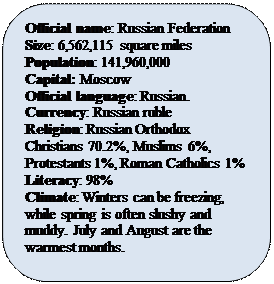 | 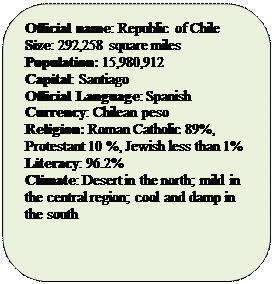 |

1. a) Work in groups of 2-3 people. Make a tour guide around your city Samara. You may choose to speak about:
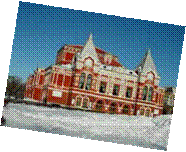
Ø The Square of Glory
Ø Kuibyshev Square / The Opera and Ballet House
Ø 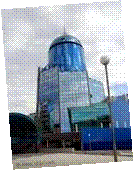 The Volga Embankment
The Volga Embankment
Ø 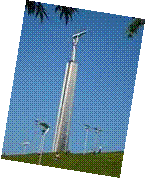 Drama Theatre / Stalin’s Bunker
Drama Theatre / Stalin’s Bunker
Ø The churches of Samara
Ø Viewing point at the helicopter site
Ø Any other place you find important

1. Make a colorful leaflet with a brief description of the places in your guided tour.


1. a) How much do you know about Great Britain? Say whether these statements are true or false.
Ø 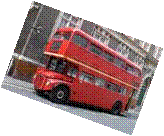 Great Britain is the largest island in Europe.
Great Britain is the largest island in Europe.
Ø London is the capital of England, but not the capital of the United Kingdom.
Ø 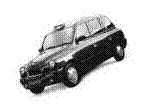 Ben Nevis is the longest river in the UK.
Ben Nevis is the longest river in the UK.
Ø  The climate is mild and the temperature in summer is never more than 25 degrees.
The climate is mild and the temperature in summer is never more than 25 degrees.
Ø British policemen are called Bobbies.
Ø Electricity in England is 240 Volts.
Ø 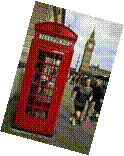 There are more chickens than humans in England.
There are more chickens than humans in England.
Ø Oxbridge is the oldest university in Britain.
Ø The most popular topics for discussions for Britons are weather and sport.
b) What do you associate with Britain?
________________________________________________________________________________________________________________________________________________________________________________________________________________________________________________________________________

1. Practise reading the following geographical names.
| The United Kingdom | [ju:’naitid kiŋdəm] | Соединённое королевство |
| Great Britain | [greit ’bri-tən] | Великобритания |
| Northern Ireland | [\ˈnȯr- th ə(r)n aiƏlend] | Северная Ирландия |
| British Isles | [britiʃ ailz] | Британские острова |
| England | [\ˈiŋ-glənd] | Англия |
| Wales | [‘weilz] | Уэльс |
| Scotland | [skotlƏnd] | Шотландия |
| Edinburgh | [ˈe-dən-ˌbər-ə] | Эдинбург |
| Belfast | [ˈbel-ˌfast] | Белфаст |
| Cardiff | [kär-dif] | Кардиф |
| The Strait of Dover | [streit Əv douvƏ] | Дуврский пролив |
| London | [l˄ndƏn] | Лондон |
| Liverpool | [livƏpu:l] | Ливерпуль |
| Glasgow | [glazgou] | Глазго |
| Ben Nevis | [ben’nevis] | Бен-Невис |
| Severn | [sevƏn] | р.Северн |
2. Match the terms with their Russian equivalents. Make use of a dictionary if necessary.
| 1) Prime Minister | a) Палата Общин |
| 2) British Parliament | b) премьер министр |
| 3) Patron Saint | c) лейбористская (рабочая) партия |
| 4) The House of Lords | d) Британский парламент |
| 5) The House of Commons | e) партия либералов |
| 6) Head of the State | f) святой покровитель |
| 7) The Labour Party | g) партия консерваторов |
| 8) The Conservative Party | h) Палата Лордов |
| 9) The Liberal Party | i) глава государства |
3. a) You are going to read the text about Great Britain. Complete the table.
| Location | |
| Total area | |
| Main parts | |
| Water Resources | |
| Industry | |
| Population | |
| Political System | |
| Language | |
| Capital(s) | |
| The flag |
 Great Britain
Great Britain
The United Kingdom of Great Britain and Northern Ireland (the UK) occupies most of the territory of the British Isles. It consists of four main parts: England, Scotland, Wales and Northern Ireland. London is the capital of England, Edinburgh is the capital of Scotland, Cardiff— of Wales and Belfast — of Northern Ireland. The UK is a small country with an area of some 244,100 square kilometres. It occupies only 0.2 per cent of the world's land surface. It is washed by the Atlantic Ocean in the north-west, north and south-west and separated from Europe by the North Sea in the east and by the English Channel in the south. The Strait of Dover is the narrowest part of the Channel. The North Sea and the English Channel are often called "the narrow seas"; they are not deep but are frequently rough.
In the west the Irish Sea and the North Channel separate the UK from Ireland. The seas around Britain provide exceptionally good fishing grounds. The country has many bays favourable for shipping. In their shelter are Britain's main ports such as London, Liverpool, Glasgow and others.
One will not find very high mountains or large plains in Great Britain. Everything occupies very little place. Nature, it seems, has carefully adapted things to the size of the island itself. The highest mountain is Ben Nevis in Scotland, 4,406 feet high. The longest river is the Severn in England.
The population of the United Kingdom is over 57 million people.
The official language of the United Kingdom is English. But in western Scotland some people still speak Gaelic and in northern and central parts of Wales people often speak Welsh.
The UK is a highly developed industrial country. It is known as one of the world’s largest producers and exporters of machinery, electronics, textile, aircraft, and navigation equipment. One of the chief industries of the country is shipbuilding.
The UK is a constitutional monarchy. In law, Head of the State is Queen. In practice, the country is ruled by the elected government with the Prime Minister at the head. The British Parliament consists of two chambers: the House of Lords and the House of Commons.
There are three main political parties in Great Britain: the Labour, the Conservative and the Liberal parties.
 The flag of the United Kingdom, known as the Union Jack, is made up of three crosses. The big red cross is the cross of Saint George, the patron saint of England. The white cross is the cross of Saint Andrew, the patron saint of Scotland. The red diagonal cross is the cross of Saint Patrick, the patron
The flag of the United Kingdom, known as the Union Jack, is made up of three crosses. The big red cross is the cross of Saint George, the patron saint of England. The white cross is the cross of Saint Andrew, the patron saint of Scotland. The red diagonal cross is the cross of Saint Patrick, the patron
saint of Ireland.
4. a) Match the following words to make adjective-noun collocations.
| 1) navigational | a) grounds |
| 2) political | b) monarchy |
| 3) fishing | c) language |
| 4) constitutional | d) equipment |
| 5) official | e) party |
| 6) elected | f) government |
| 7) favourable | g) sea |
| 8) rough | h) industry |
| 9) shipbuilding | i) conditions |
b) Give the Russian equivalents of the phrases above.
5. Match the words with their definitions. State their part of speech.
 1) shelter (n) 1) shelter (n)
| a) a town by the sea or by a river which has a harbour |
| 2) port | b) protection from bad weather, danger or attack |
| 3) bay | c) a rule, usually made by a government |
| 4) machinery | d) a group of people who form (part of) a parliament |
| 5) law | e) a written mark (x), a long vertical line with a shorter horizontal line across it |
| 6) chamber | f) a part of the coast where the land curves in so that the sea is surrounded by land on three sides |
| 7) cross | g) hardware equipment |
| 8) shipping | h) often |
| 9) frequently | i) moving, transporting |
6. a) Fill in the gaps with the words and phrases from the box below.

Almost 5 million people born overseas live in Australia. More (1)_____________ move to Sydney than any other Australian city.
Australia’s agriculture sector is very important to its economy. Sales of beef, wheat, (2)_____________and wool account for more than one half of Australia’s (3)______________.
Australia’s main natural hazards are cyclones (hurricanes), drought and (4)____________. The biggest killer of all has been heatwaves.
Australia has the lowest precipitation of any of the world’s continents. 70 percent of Australia gets less than 500 mm (20 inches) of (5)____________ per year.
Australia is the world’s smallest continent and the world’s sixth largest country. Australia covers (6)_______________ of 7,686,900 square kilometres.
Australia has long been known as the lucky country. This is not surprising when you learn it is the world’s largest iron ore exporter and (7)___________ of bauxite and alumina. Australia also has the world’s largest (8)____________ of silver, zinc, zircon and easily extracted uranium (over 40% of world resources). It also has about 10 percent of the world’s gold resources.
Australians are crazy about sport. The most popular participation sports are aerobics, (9)_____________ and tennis.
b) Translate the text into Russian.
| You should remember the following words and phrases! | |
| rough | суровый(о климате), бурный (о море) |
| bay | бухта, залив |
| favourable | благоприятный |
| shipping | грузоперевозка |
| machinery | машинное оборудование, станки |
| shipbuilding | судостроение |
| chamber | палата |
| elect | избирать |
| shelter | приют, кров |
| the English Channel | Ла Манш |
| plain | равнина |
| navigation equipment | навигационное оборудование |
| wool | шерсть |
| constitutional monarchy | конституционная монархия |
| overseas | за границей |
| drought | засуха |
| heatwave | тепловая волна |
| precipitation | осадки |
| natural hazard | стихийное бедствие |
| wheat | пшеница |

English modal verbs are special verbs that are used to show possibility, ability, permission, and so forth. English Modal Verbs show us the attitude of the speaker to what is being said. They are special because they behave differently from other verbs in English:
1) English modal verbs are used together with the base form of another verb.
2) English modal verbs have only one form. You don't add "-ing", "-ed" or "-s" to them.
3) To form questions use the modal verb itself, but change the order.
4) To form negative sentences use the modal verb itself and add "not" or "n't" to it.
| Modal Verb | Usage | Example |
| can | ability | I can run. |
| possibility | Miracles can happen. | |
| permission | You can go now. | |
| informal request | Can you come for a minute? | |
| could | past form of ‘can’ | I could run fast when I was 5. |
| polite request | Could you move your bag, please? | |
| possibility | It could be that he missed the train. | |
| may | permission (formal) | May I speak? |
| possibility | It may rain tomorrow. | |
| might | past form of ‘may’ | He said he might change his mind. |
| possibility | It might rain tomorrow. | |
| must | necessary, important to do | You must obey the law. |
| logical/likely to happen | They left so early, they must be home by now. | |
| mustn’t | you are not allowed to do it | You mustn't smoke in here. |
| shall | questions and suggestions for "I" and "we" | Let's continue, shall we? |
| should | the right thing to do | She should call the police. |
| advice | You should stop thinking about it. | |
| what is likely or expected to happen | We should be back by midnight. | |
| will | future action or states (not plans) | Prices will go up next summer. |
| promises and intentions | It's alright, I'll pick it up. | |
| would | past form of "will" | He told me he would come. |
| for polite requests, offers and invitations | Would you please sit down? | |
| to say what you want to do or have | I would like a piece of cake. | |
| ought to | the right thing to do | You ought to apologize. |
1. Fill in the gaps with the suitable modal verb. Explain your choice. Translate the sentences into Russian.
a) You __________ go to Great Britain if you want to learn more about England and the English.
b) If you want to go from England to France, you __________ catch a plane or drive along the tunnel under the English Channel.
c) If you ever visit London, you ___________ for sure take a ride on the London Eye which is the tallest observation wheel in Europe.
d) The weather in England ___________ not be always favourable for walking trips even in summer.
e) Next time I go to Great Britain, I _________ definitely go to Wales famous for its beautiful scenery.
f) I ___________ like to see all the popular sight in London including the Trafalgar Square, the Buckingham Palace and the Tower of London.
g) In London Zoo you ________ feed the animals.
h) You _________ be polite with local people.
i) Let’s go to Oxford next weekend, _________ we?
j) During my trip to London in 2008 I ______________ understand English people well because my English was quite good.
2. Paraphrase the following sentences using modal verbs.
a) It is impossible to sneeze with your eyes open.
__________________________________________________________________
b) It is necessary to wear long-sleeved clothes in a Buddhist temple.
__________________________________________________________________
c) Elizabeth I recommended people to wash themselves once every three month whether they need it or not.
__________________________________________________________________
d) A cockroach is able to live several weeks with its head cut off.
__________________________________________________________________
e) It’s against the law to burp or sneeze in a church in Nebraska, USA.
__________________________________________________________________
f) Admiral Nelson was never able to find medicine for his sea-sickness.
__________________________________________________________________
g) Some worms intend to eat themselves if they can’t find any food.
__________________________________________________________________
h) It is likely that honey is the only food that does not spoil.
__________________________________________________________________
i) It is possible that the average man laughs ten times a day.
__________________________________________________________________
3. Translate the following sentences from Russian into English paying special attention to modal verbs.
a) Специалистам необходимо иметь современное навигационное оборудование, чтобы контролировать грузоперевозки.
b) При засухе животные Африки могут найти приют в оазисах.
c) Если море неспокойное, суда обязаны оставаться в порту.
d) В следующем году в этом регионе ожидается минимальное количество осадков.
e) Основная масса переселенцев хотела бы жить на побережье, поскольку там они смогли бы найти работу в судостроительной отрасли промышленности.
f) При конституционной монархии Королева не может управлять страной.
g) Этот кандидат очень популярен у местного населения, должно быть, он станет следующим премьер-министром.
h) Давайте закупим санки для нашего завода за границей.
i) Вам следует выбирать отель на берегу Ла Манша, если вы хотите насладиться свежим морским воздухом.
j) Практически каждый английский ребенок умеет играть в футбол, так как этот вид спорта - самый популярный в Великобритании.

1. Read the e-mail from your English penfriend Paul. Is it formal or informal? How do you know it?

Informal letters are characterized by:
Ø Contractions (*we’ll, it’s)
Ø Exclamations (!!!)
Ø Emoticons (J)
Ø Slang (*guys, movies)
Ø Simple greetings (Hi Alex!)
2. Write a reply to the e-mail from ex.1 on behalf of Alex, giving the necessary information in an informal style. Accept the invitation.

1. Work in pairs. Role play the telephone conversation between Alex and Paul. Pay attention to the role cards below. Make use of the expressions from the help box.

Дата добавления: 2015-10-28; просмотров: 153 | Нарушение авторских прав
| <== предыдущая страница | | | следующая страница ==> |
| Принцип возможных перемещений. | | | Какие средства производства относятся к основным? |